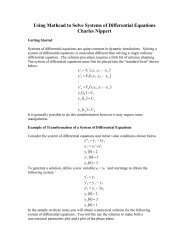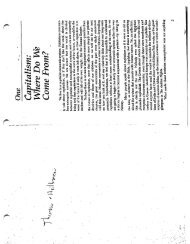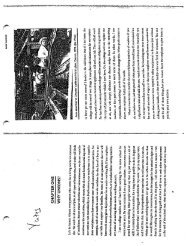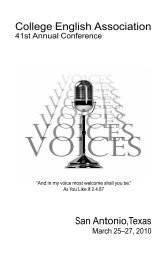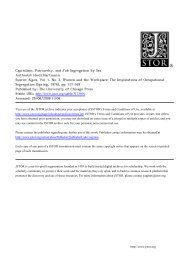Ethics - Widener University
Ethics - Widener University
Ethics - Widener University
You also want an ePaper? Increase the reach of your titles
YUMPU automatically turns print PDFs into web optimized ePapers that Google loves.
Call for Papers | CEA 2008<br />
Passages<br />
39th Annual Conference | March 27-29, 2008 | St. Louis, Missouri<br />
How do we think about passages? Are they just rites we go through as we grow up? or is any<br />
journey a passage? Are thresholds passages? Can we define what marks a passage? Is it some<br />
personal or communal experience? How do we think about travel<br />
For our 2007 meeting, CEA invites papers and panels that consider how we construct and understand<br />
passages and how those understandings inform what we write, read, and teach?<br />
We invite papers or panels on all areas of literature, languages, film, composition, pedagogy,<br />
creative writing, business/technical writing, etc., that explore aspects of the conference theme.<br />
Proposals may interpret the CEA theme broadly, including—but not limited to—the following<br />
possible areas:<br />
• Rites of Passage: physical, psychological, emotional, imaginative, cultural, relational<br />
• Journeys: diaspora, aging, heroic quests, mythic journeys, and coming-of-age narratives<br />
• Personal journeys: disfigurement, disability, poverty, diasposa, refugee status, discrimination,<br />
job loss, divorce, disease, death<br />
• Physical Passages: travels, tunnels, mountains, oceans, gaps, river-crossing, bridges<br />
• Rhetorical Passages: tropes of rhetoric,<br />
• Literary Passages: is the idea of close reading of a “passage” still a valid construct? how do we<br />
identify passages for students? where does a passage begin and end?<br />
• Spiritual Passages: the real world vs. the mystical world, metaphysical moments, liminal<br />
perceptions, thresholds, the revelatory, transformations and transfigurations, epiphanies<br />
• American Passages: migrants and immigrants, pioneers of expansion and settlement, pioneers<br />
of progress, the hobo and the vagabond, the runaway, slaves/ex-slaves and abolitionists, delinquents<br />
and reformers, the impoverished and the affluent, American dreams and dreamers,<br />
the triumphal rise of “geeks” and “nerds,” idols and icons--American-style<br />
• Rhetorical Passages: tropes of thetoric, constructs of discourse, configurations and conjurations,<br />
speeches and speechifying, pulpits and soap boxes<br />
• American Passages: migrants and immigrants, pioneers of expansion and settlement, pioneers<br />
of progress, the hobo and the vagabond, the runaway, slaves/ex-slaves and abolitionists, delinquents<br />
and reformers, the impoverished and the affluent, American dreams and dreamers,<br />
the triumphal rise of “geeks” and “nerds,” idols and icons, American-style<br />
We encourage consideration of these and other questions related to the conference theme:<br />
• How are passages portrayed in literature and film?<br />
• How do works of fiction, poetry, film, and memoir articulate passages?<br />
• How does travel literature convey the idea of passages, both complete and incomplete?<br />
• Does human response to issues of passages differ historically and regionally? How is that<br />
response depicted in literature, film, etc.<br />
• How are passages addressed in the English classroom, in what we read, write, research, and<br />
teach and practice as professionals?<br />
• How are our students challenged to consider ideas of passage?<br />
• What role does difference (in culture, in ethnicity, in gender, in sexual preference) make in<br />
ideas of passage?<br />
• How do students write about passages? should they? are they able to respond critically to the<br />
passages of their own lives?<br />
CFP for CEA 2008 | St Louis iii


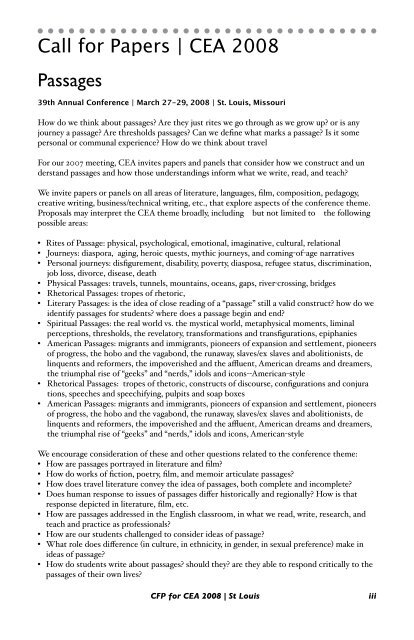
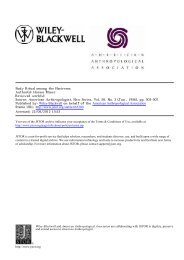
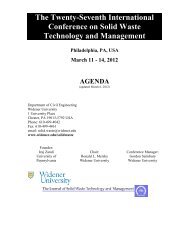
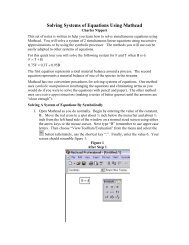
![Programming and 2-D Plots in Mathcad Charles Nippert [ ] [ ]](https://img.yumpu.com/36361996/1/190x245/programming-and-2-d-plots-in-mathcad-charles-nippert-.jpg?quality=85)
